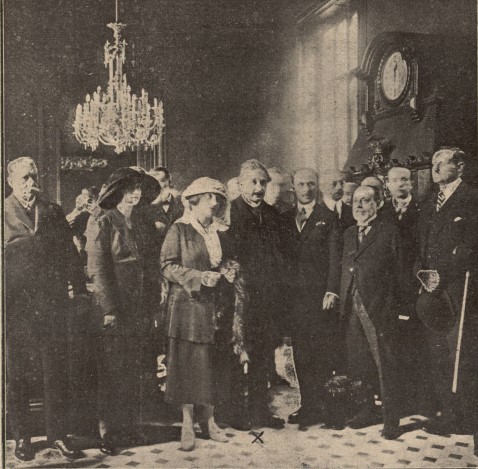- IT HAPPENEDScience
- 22 de February de 2025
- No Comment
- 7 minutes read
Albert Einstein

IT HAPPENED…
On February 22, 1923
Albert Einstein arrived in Barcelona


On February 22, 1923, Albert Einstein arrived in Barcelona. He stayed in the city for six days, during which he gave several lectures to spread his physical concepts on relativity.
He was preceded by his fame, invited by the Spanish Government and the Mancomunitat de Catalunya, passing first through Barcelona and then through Madrid. The previous year he had been awarded the Nobel Prize in Physics, although not for his most notable and meritorious contribution to science, the Theory of Relativity, but for his studies on the photoelectric effect. The Swedish Academy of Science was not yet very clear about space-time and relativity, so it opted for prudence and preferred, to avoid controversy, to award him the Nobel for a work that, although important, was marginal in its scientific activity. His heterodox scientific positions and the popularity he had achieved predicted that he would arrive to the praise of multitudes. And so it was, but not at first.
He arrived at the Estación de Francia in Barcelona, accompanied by his second wife Ilse, from Paris, but no one came to the station to greet him. He then went to the home of Esteve Terrades, the engineer and mathematician who had arranged the invitation, who was not at home. He left his address and went with his wife to the first boarding house he found: “Pensión las Cuatro Naciones”, a hovel. Once the mess was sorted out, the authorities accommodated them in the Hotel Colón, in Plaza Cataluña.
There are two versions about the cause of such an insipid welcome. Some say that Einstein had not informed anyone of the time of his arrival; others attribute it to the proverbial Mediterranean disorder. Anyway. Contrary to what is usually thought by resorting to the cliché, the truth is that in those times, although from a certainly semi-peripheral position, Spanish scientists, and no less Catalan ones, were aware of the scientific progress and debates of the moment. Even so, we could say about his lectures in Barcelona something very similar to what Julio Gamba described in the newspaper ‘El Sol’ about those he gave the following week in Madrid: “Undoubtedly, all of us gathered there admired him a lot; but if someone asks us why we admired him, we would be in a rather serious bind”.
In the assembly hall of the Barcelona Provincial Council and in front of about a hundred people, he gave a course on the theory of relativity in three sessions: restricted relativity, general relativity and current problems. He also gave a fourth additional lecture at the Royal Academy of Sciences and Arts of Barcelona. The transcripts of his lectures were published in full in the newspaper La Vanguardia; of course, with the due counterpoint of the objections of Josep Comas i Solà, the local anti-relativist physicist.
Einstein’s hosts and guides during his stay in Barcelona were the aforementioned Esteve Terrades and Rafel Campalans, an engineer like the former. With them he shared an excursion to the Poblet Monastery on February 25, passing through l’Espluga de Francolí. Back in Barcelona, and with a few more guests, a dinner took place with an enigmatic menu consisting of names intentionally written jokingly in “relative” Latin, alluding to scientists and philosophers in the manner of riddles, such as Cannulae Fizeauniensis, Fructus Galilei, Homo platonicus secundum, Diogenem cum jure Michelsoniense, Malum parvum cum Doppler effectu, Caffea sobraliensis cum spirituosibus liquoribus et vectoribus tabacalibus…
It is known that the dinner was well stocked with wines and champagne – Einstein was not a timorous person – but although it is unknown whether or not it was because of the spirituosibus liquoribus – which always help to keep the conversation going – and the corresponding vectoribus tabacalibus – in those days, the anti-smoking people were either not invited or they put up with it – the truth is that the matter turned to politics, and then occured the anecdote that we will refer to below.
It should be understood that we are talking about an intellectual gathering in the full enlightened sense of the term, that is, one led by people who, in addition to being cultured, they were polite and had manners, unlike many current gatherings and tertulians. So, in the drift of the conversation the political black beast of these times arose: the rise of nationalism in Central Europe, especially in Germany. Campalans told Einstein that he was a nationalist and left-wing – a Catalan nationalist, it is assumed. Faced with such a statement, Einstein made one of those perplexed faces that he knew so well how to make and replied in German: “Das passt nicht zusamnen!”
That is: these two things cannot happen together. Campalans said some time later that he tried to explain the nuances of his statement to Einstein, and that Einstein replied: “So this is not nationalism, remove this sinister word from your ideology.”
On March 28, Einstein took the train to Madrid. He wrote a short paragraph in his diary about his stay in Barcelona and left a blank page, perhaps to fill it in later, although he never did it. The only thing he wrote was the following:
February 22-28. Stay in Barcelona. Very tiring, but friendly people (Terradas, Campalans, Lana, Tirpitz’s daughter), popular songs, dances, Refectorium, it was nice!
Source: educational EVIDENCE
Rights: Creative Commons

